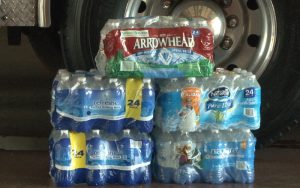PHOENIX – Summer heat is deadly for the homeless, spurring public officials and nonprofits to offer water and other help.
Phoenix and a network of cities in the Valley are asking residents to donate bottled water at collection sites in the metro area to give to the homeless and others in need.
Advocates said the help is particularly needed as weekend temperatures are forecast to be scorching, reaching as high as 114 on Friday, 118 on Saturday and 116 on Sunday, according to the National Weather Service in Phoenix.

The Phoenix Fire Department is asking citizens to donate water this summer for the homeless population. (photo by Eddie Keller/Cronkite News)
“Approximately 10 homeless individuals died on the street during the summer months due to heat related illness,” said J. David Smith, the communication director at Central Arizona Shelter Services, about last year’s heat wave.
The shelter service and Phoenix Fire Department are collaborating to ask residents to donate bottled water to any fire station in the city.
“You can bring a case, you can bring three bottles, you can bring a gallon. We’re going to get them to the homeless shelters and make sure that the homeless stay hydrated,” said Phoenix Fire Capt. Rob McDade.
“This weekend is a perfect example of why we’re doing this,” McDade said, adding that he’s pleased donations are coming in. “The sooner the better. The quicker the better.”
The Maricopa Association of Governments, a network of elected city officials, provides a summer heat-relief system of water donation sites and hydration stations for people who need water or other supplies.
Other groups also are reaching out to those in need.
Richard Lee Smith runs My Father’s House in a dirt lot at 3030 W. Van Buren that doesn’t attract much attention. They’ve quietly helped the homeless for 17 years.
“They can come by here any time and be able to get water if they need water. And also we hand out a lot of fruit too. It’s cold, it’s refreshing,” Smith said.
Fresh fruit, bread and pastries line the shelves of refrigerators and freezers. Cases of water cover the ground and tables. They even freeze some water bottles.
“A lot of people take frozen bottles of water because you get down the road a block or two and it’s already melted,” Smith said.